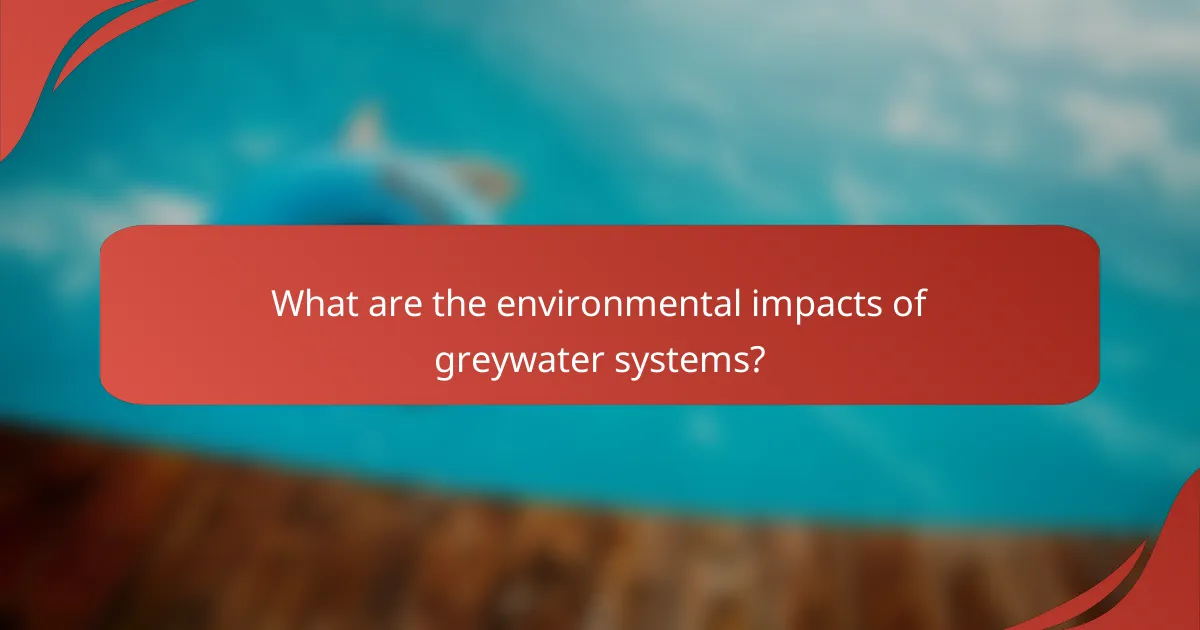Innovative greywater systems offer an effective solution for recycling wastewater from household activities, such as bathing and laundry, to support sustainable landscaping. By utilizing this recycled water for irrigation, these systems not only conserve precious resources but also help homeowners reduce their utility bills and promote eco-friendly gardening practices.

What are innovative greywater systems for sustainable landscaping?
Innovative greywater systems are designed to recycle wastewater from household activities, such as bathing and laundry, for use in landscaping. These systems help conserve water, reduce utility bills, and promote sustainable gardening practices.
Definition of greywater systems
Greywater systems collect and treat wastewater that is not contaminated by toilet waste. This includes water from sinks, showers, and washing machines. By redirecting this water for irrigation, greywater systems can significantly reduce the demand for fresh water in landscaping.
Typically, greywater is filtered and stored in a holding tank before being distributed to plants. It’s crucial to ensure that the system complies with local regulations regarding greywater use to avoid potential health hazards.
Benefits for landscaping
Using greywater in landscaping offers numerous benefits, including reduced water consumption and lower irrigation costs. Homeowners can save a substantial amount on their water bills, especially in areas with high water rates or during drought conditions.
Additionally, greywater can enhance soil health by providing essential nutrients. Plants benefit from the organic matter present in greywater, leading to healthier growth and improved resilience against pests and diseases.
Types of greywater systems
There are several types of greywater systems, each suited for different needs and landscapes. Simple systems may involve direct diversion of greywater to garden beds, while more complex setups include treatment processes to ensure safety and efficiency.
- Gravity-fed systems: These rely on gravity to move water from the source to the garden, making them low-maintenance and cost-effective.
- Pumped systems: These use pumps to distribute greywater, allowing for more flexibility in design but requiring more maintenance and energy.
- Constructed wetlands: These systems mimic natural wetlands to treat greywater, providing both filtration and habitat for wildlife.
When selecting a greywater system, consider factors such as the volume of greywater produced, local regulations, and the specific landscaping needs of your property. Proper installation and maintenance are essential for maximizing the benefits of greywater use in landscaping.

How do greywater systems improve water efficiency in landscaping?
Greywater systems enhance water efficiency in landscaping by recycling water from sinks, showers, and washing machines for irrigation. This practice reduces reliance on potable water, contributing to sustainable water management.
Reduction in potable water use
By utilizing greywater for irrigation, homeowners can significantly decrease their consumption of potable water. This shift not only conserves a vital resource but also helps in maintaining the health of local water supplies. For instance, a typical household can recycle hundreds of liters of water weekly, depending on family size and water usage habits.
Implementing a greywater system requires careful planning to ensure compliance with local regulations. Many areas have guidelines on what types of greywater can be reused and how to safely distribute it in landscaping.
Cost savings on water bills
Using greywater can lead to substantial savings on water bills, especially in regions with high water costs. Households that implement greywater systems may see reductions of up to 30% in their monthly water expenses, depending on usage and local rates.
To maximize savings, consider installing a system that allows for easy collection and distribution of greywater. Regular maintenance is essential to prevent clogs and ensure efficient operation, which can further enhance cost-effectiveness over time.

What are the best greywater systems for residential landscaping?
The best greywater systems for residential landscaping efficiently recycle water from sinks, showers, and laundry for irrigation purposes. These systems help conserve water and reduce utility bills while promoting sustainable gardening practices.
Brac Greywater System
The Brac Greywater System is designed for easy installation and maintenance, making it a popular choice for homeowners. It utilizes a simple filtration process to separate greywater from solids, allowing for safe reuse in gardens.
One key consideration is its capacity, which typically handles around 200 to 300 liters of greywater daily. This system is ideal for small to medium-sized households, especially in regions with moderate water restrictions.
WaterWise Greywater System
The WaterWise Greywater System focuses on maximizing water efficiency through advanced treatment methods. It employs a multi-stage filtration system that ensures the greywater is clean enough for use on edible plants.
This system can manage larger volumes, often exceeding 400 liters per day, making it suitable for larger families or homes with extensive landscaping. Homeowners should ensure compliance with local regulations regarding greywater use, particularly for edible crops.
Eco-Safe Greywater System
The Eco-Safe Greywater System emphasizes environmental safety by using non-toxic materials and processes. It features a biological treatment component that breaks down contaminants naturally, ensuring the water is safe for irrigation.
With a daily capacity similar to the WaterWise system, it is effective for households looking to maintain a sustainable garden. Users should regularly monitor the system to prevent clogs and ensure optimal performance.

What are the installation requirements for greywater systems?
Installing greywater systems requires careful planning and adherence to local regulations. Key requirements include obtaining necessary permits, understanding system components, and ensuring compliance with health and safety standards.
Permits and regulations
Before installing a greywater system, check local regulations as they vary widely by region. Many areas require permits to ensure that the system meets health and environmental standards.
Common regulations may include restrictions on the types of greywater that can be reused, such as limiting use to laundry or shower water. Always consult local authorities or a licensed professional to navigate the permitting process effectively.
System components needed
A typical greywater system includes several essential components: a collection tank, filtration system, and distribution network. The collection tank gathers greywater, while filtration removes contaminants to ensure safe reuse.
Additionally, a pump may be necessary to move water from the tank to irrigation systems. Consider using drip irrigation or subsurface systems to minimize evaporation and maximize efficiency.

How do greywater systems affect plant health?
Greywater systems can significantly enhance plant health by providing a sustainable source of irrigation and nutrients. These systems recycle water from household activities, which can lead to improved growth and resilience in landscaping.
Nutrient benefits
Greywater often contains beneficial nutrients such as nitrogen, phosphorus, and potassium, which are essential for plant growth. When used properly, this recycled water can reduce the need for chemical fertilizers, promoting a healthier ecosystem.
To maximize nutrient benefits, ensure that the greywater source is free from harmful chemicals, such as those found in certain soaps and detergents. Using biodegradable products can help maintain the quality of the greywater and its suitability for irrigation.
Soil moisture retention
Greywater systems contribute to improved soil moisture retention, which is crucial for plant health, especially in arid regions. By regularly applying greywater, the soil structure can be enhanced, allowing it to hold more moisture over time.
Consider incorporating mulch or organic matter into your landscaping to further improve moisture retention. This combination of greywater irrigation and organic amendments can create a more sustainable and resilient landscape.

What are the challenges of using greywater systems?
Greywater systems face several challenges, including maintenance, potential health risks, and regulatory compliance. Understanding these issues is crucial for successful implementation and operation.
Maintenance requirements
Regular maintenance is essential for greywater systems to function effectively. This includes routine inspections, cleaning filters, and ensuring that pipes are free from blockages. Neglecting maintenance can lead to system failures and costly repairs.
Homeowners should establish a maintenance schedule, typically every few months, to check for leaks and monitor water quality. Keeping a log of maintenance activities can help track the system’s performance and identify any recurring issues.
Potential health risks
Using greywater can pose health risks if not managed properly, as it may contain pathogens and contaminants. It is important to avoid using greywater from sources like toilets, as this increases the risk of disease transmission.
To mitigate health risks, systems should be designed to treat greywater effectively before reuse. Homeowners should also educate themselves on local regulations regarding greywater use, as some areas have specific guidelines to ensure safety and compliance.

What are the environmental impacts of greywater systems?
Greywater systems significantly reduce the environmental impacts associated with wastewater by recycling water from sinks, showers, and laundry for irrigation and landscaping. This practice conserves fresh water, decreases the burden on sewage treatment facilities, and minimizes the need for additional water sources.
Reduction of wastewater
Greywater systems contribute to the reduction of wastewater by redirecting water that would otherwise enter sewage systems. By reusing this water for irrigation, these systems can lower the volume of treated wastewater, which is especially beneficial in urban areas where water scarcity is a concern.
Implementing a greywater system can lead to a decrease in household water usage by approximately 30-50%. Homeowners can collect water from various sources, such as washing machines and bathroom sinks, and use it for landscape irrigation, thus minimizing overall water waste.
To effectively reduce wastewater, homeowners should ensure their greywater systems comply with local regulations. It’s essential to avoid using harmful chemicals in soaps and detergents, as these can contaminate the greywater and impact soil and plant health. Regular maintenance and monitoring of the system will help maximize its efficiency and sustainability.
